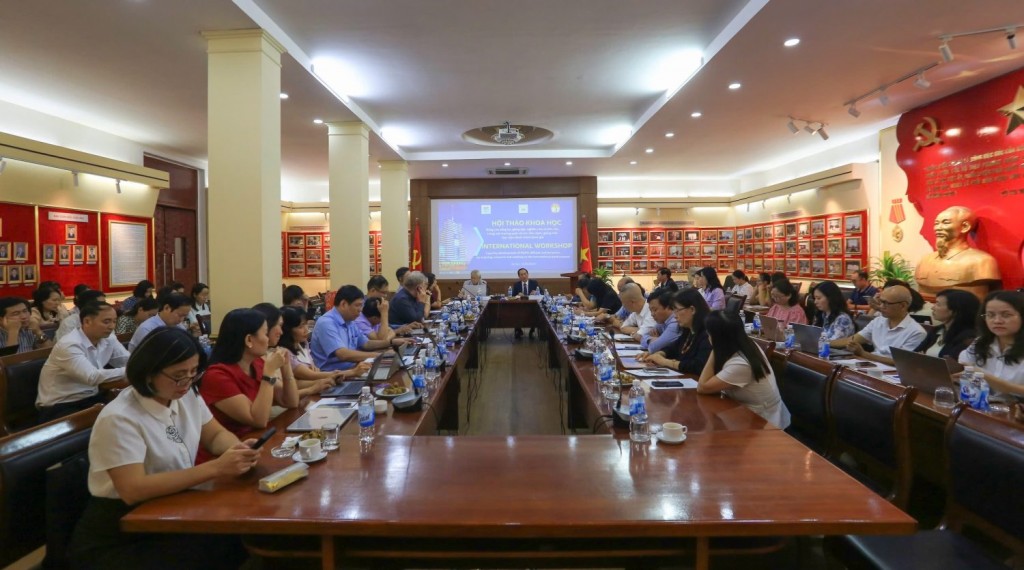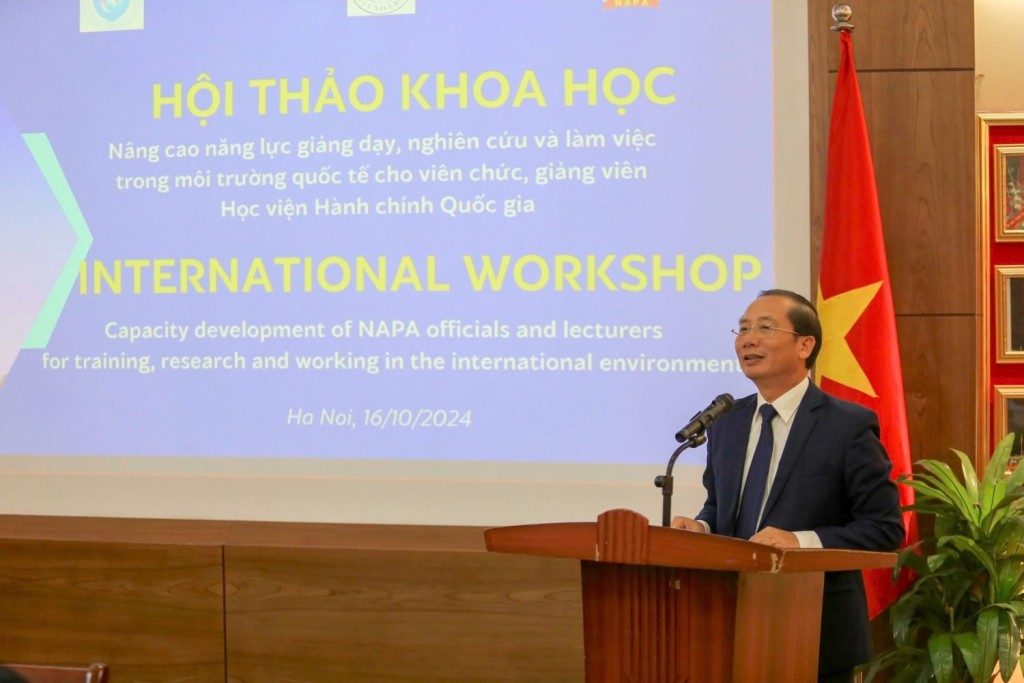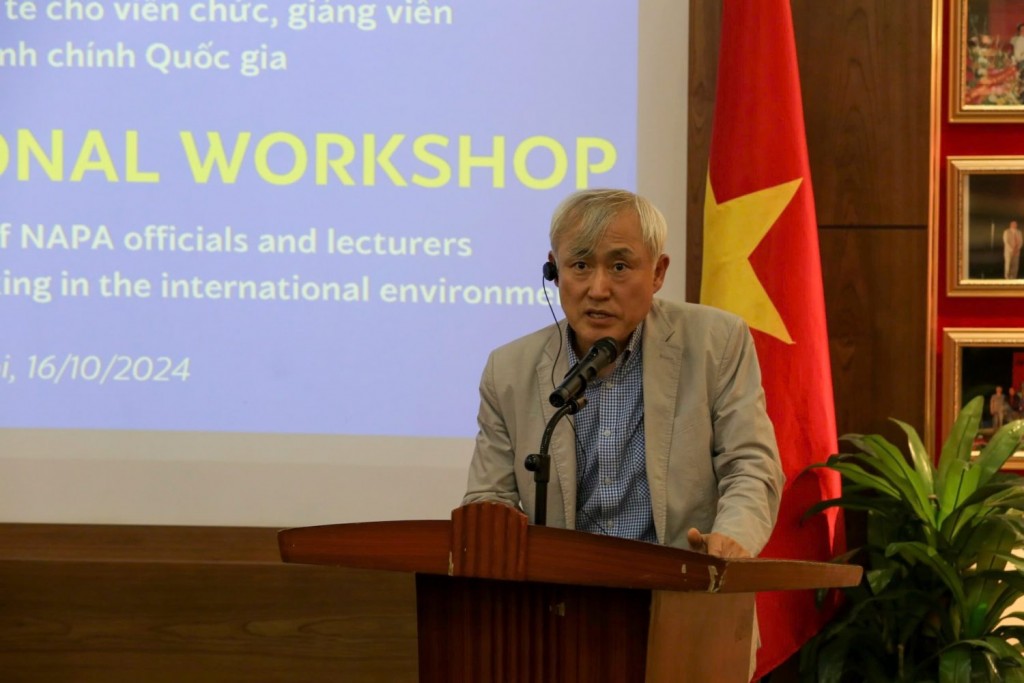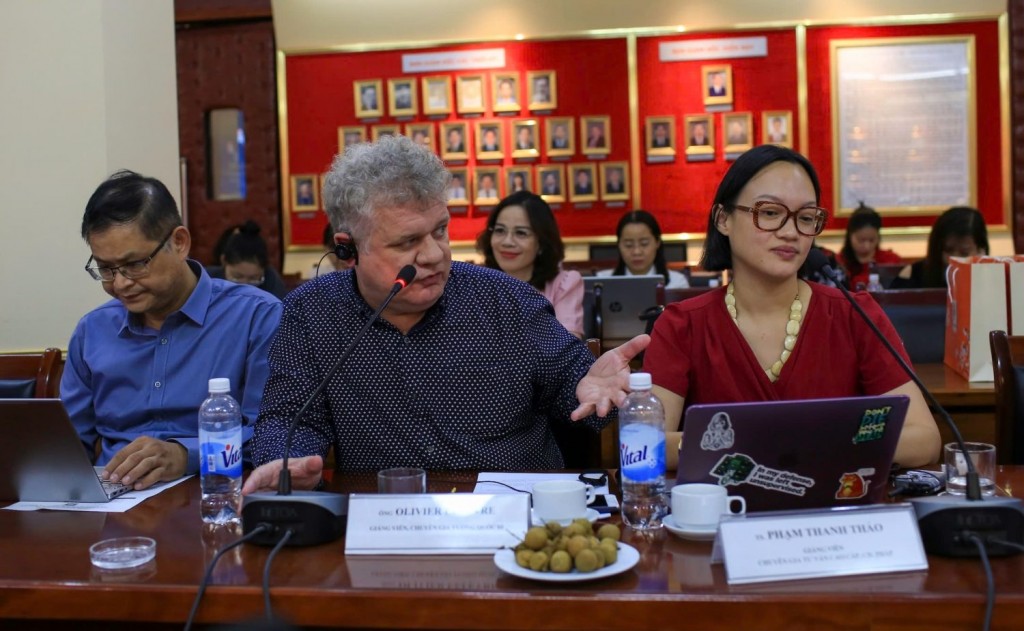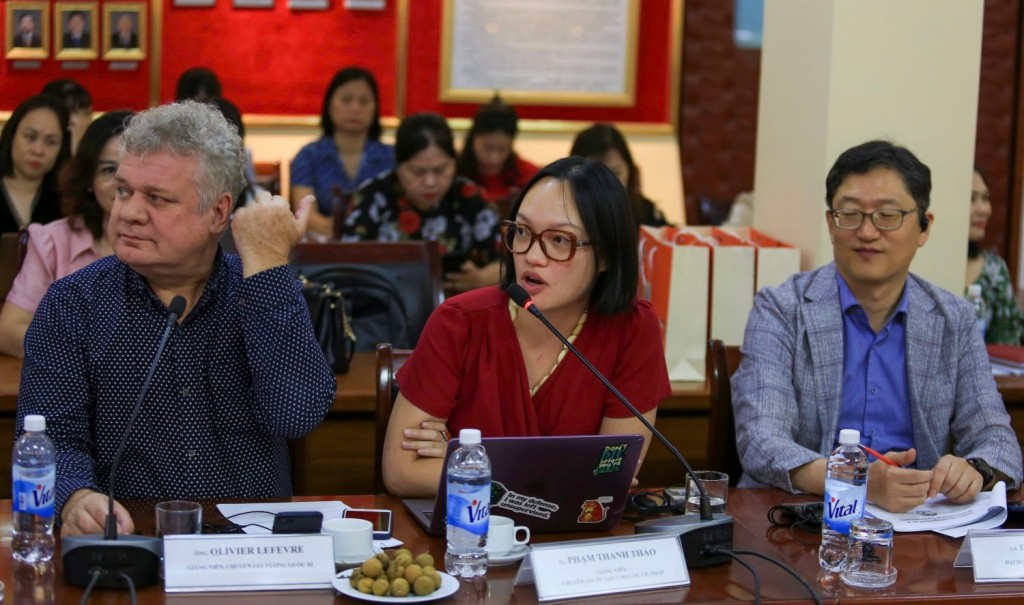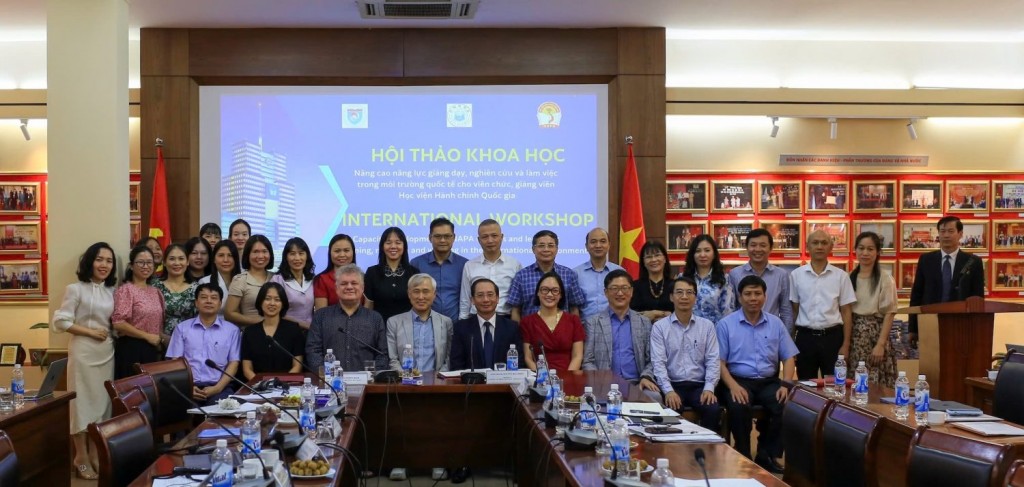On October 16, 2024, at NAPA Headquarters in Ha Noi, the National Academy of Public Administration (NAPA) collaborated with INHA University and Sunmoon University, South Korea, to organize an international workshop titled “Capacity Development of NAPA Officials and Lecturers for Training, Research, and Working in the International Environment.” The workshop was held both in person and online, with connections to NAPA campuses in Ho Chi Minh City, Dak Lak, and Quảng Nam. The workshop was co-chaired by Assoc. Prof. Dr. Nguyen Ba Chien, NAPA President, and Prof. Youngsoon Kim from INHA University, South Korea.
In attendance on the international guest side were Prof. Daeyeon Jin from Sunmoon University, South Korea; Dr. Soan Choi from INHA University, South Korea; Dr. Pham Thanh Thao, lecturer and senior consultant from the French Republic; and Mr. Olivier Lefevre, expert from the Kingdom of Belgium.
On the side of NAPA, the workshop featured the participation of Vice Presidents: Dr. Nguyen Dang Que, Assoc. Prof. Dr. Luong Thanh Cuong, Assoc. Prof. Dr. Nguyen Quoc Suu, along with representatives from various NAPA departments, faculties, and units.
In his opening remarks, Assoc. Prof. Dr. Nguyen Ba Chien emphasized the need to promote active and proactive international integration among NAPA staff. He referred to Resolution No. 26/NQ-TW, dated May 19, 2018, from the Seventh Plenary Session of the 12th Central Executive Committee, which identified specific goals, requirements, and timelines for improving the ability of public officials to work in an international environment. He acknowledged this as a significant challenge for managers and civil servants, which requires all sectors and agencies to develop plans for enhancing the international integration capabilities of officials in their units. In this spirit, on October 1, 2024, the Minister of Home Affairs issued Decision No. 689/QĐ-BNV approving the NAPA’s development strategy through 2030, with a vision towards 2045. This strategy aims to build and develop NAPA into a national center at the Asia-Pacific level for training, research, and policy consulting on public administration, leadership, and management.
The workshop served as a platform for renowned international experts with extensive practical experience working in an international environment to share and discuss key topics, including (1) The context of international integration, major global trends, and the need to enhance the capacity of civil servants and public employees, particularly staff and lecturers of NAPA, to integrate and work in an international environment; (2) International experiences in developing the capacity to work in a multicultural international environment; (3) The NAPA’s development strategy up to 2030, with a vision towards 2045, and the requirements for improving the research, teaching, and working capacities of NAPA officials and lecturers in an international environment; (4) Discussions on solutions to develop the teaching, research, and working capacities of NAPA staff and lecturers in an international environment, contributing to the effective implementation of the NAPA’s strategic goals.
In his presentation titled “Coexisting human and intercultural education for a multicultural society”, Prof. Youngsoon Kim shared insights into the development of skills for coexistence and intercultural skills in a multicultural society. He discussed the identity of multicultural society and humanities, the establishment of multicultural humanities, and the direction of practice. According to him, humans are the creators of culture, and a sustainable society must first cultivate sustainable people. In this regard, education is paramount, starting from the family, school, and society, and learning from the international environment, to develop sustainable education aimed at fostering a sustainable society. He also emphasized that every citizen should possess three core competencies (i.e., humanities reflection, social science exploration, and pedagogical practical competence).
At the workshop, Dr. Pham Thanh Thao and Mr. Olivier Lefevre discussed the context of international integration, major global trends, and their impact on the need to improve the capacity of civil servants and public employees to integrate and work in an international environment. Currently, the world is affected by climate change, global warming, pandemics, challenges in digital transformation and automation in service provision, and increasing economic interdependence, all of which underscore the growing importance of cooperation and international organizations.
Additionally, cultural differences, language barriers, and stereotyping can lead to misunderstandings in communication. Variations in training and personal experiences result in different work environments, which significantly affect the international workplace. This highlights the critical importance of mastering skills and acquiring core competencies for working in an international setting. These include cultural intelligence (understanding different cultural norms), cross-cultural communication (avoiding miscommunication), diplomacy & negotiation (international partnerships management), and adaptability (flexibility to respond to global trends). Currently, there are eight major trends influencing the need to enhance the capacity for international integration and working in an international environment for civil servants and public employees: (1) Globalization Challenges for Civil Servants; (2) Adapting to the Digital Age; (3) Climate Change and Sustainability; (4) AI and automatic translation; (5) Interculturalism; (6) Multipolar world; (7) Shift in global power; and (8) Rising conflictuality.
Dr. Pham Thanh Thao offered several tips for better cultural understanding, such as paying close attention to what others say, asking questions to clarify and learn more, demonstrating that you are genuinely interested, treating everyone with respect, regardless of their background, avoiding judgment and prejudice, staying receptive to new ideas and viewpoints, being willing to consider alternative ways of doing things, and acknowledging that there are many valid approaches to a situation. According to her, cultural diversity is the human’s greatest asset in addressing global challenges, so it is time to work together and make a positive impact.
The workshop featured detailed responses from experts to questions and comments on topics such as expert perspectives on addressing trends impacting the need to enhance public officials’ capacity for international integration and working in a global environment; how cultural intelligence should be specifically defined and how one can develop it; and experiences of Asians working with Europeans.
Concluding the workshop, Assoc. Prof. Dr. Nguyen Ba Chien shared that NAPA has actively participated in multilateral and bilateral international cooperation in the field of public administration training and research. NAPA is a State member of the Eastern Regional Organization for Public Administration (EROPA), the International Association of Schools and Institutes of Administration (IASIA), and the Asian Group for Public Administration (AGPA), among others. Additionally, NAPA maintains multilateral and bilateral partnerships with various international organizations in Viet Nam, such as the UNDP, JICA (Japan), KOICA (South Korea), DANIDA (Denmark), and WUS (Germany). It has established cooperation with about 50 prestigious institutions worldwide and signed cooperation agreements with nearly 20 research and training institutions for public administration globally.
In today’s multicultural integration environment, NAPA strives to become a national center of regional and global stature in Asia-Pacific and beyond, excelling in the training of civil servants and public employees; in providing high-quality university, master’s, and doctoral education focused on research, application, and innovation; and in conducting academic research, knowledge creation, and policy advice on public administration, leadership, and management. This contributes significantly to the country’s renovation and development. To achieve this, every staff member, lecturer, and researcher needs to make greater efforts to overcome language barriers in the international working environment.
Assoc. Prof. Dr. Nguyen Ba Chien expressed his gratitude to the international experts for their time and valuable knowledge shared at the workshop. He emphasized the NAPA’s hope to continue working alongside these experts in international cooperation activities and in enhancing the international work capacity of NAPA officials and lecturers, thereby positively contributing to the NAPA’s strategic objectives.


